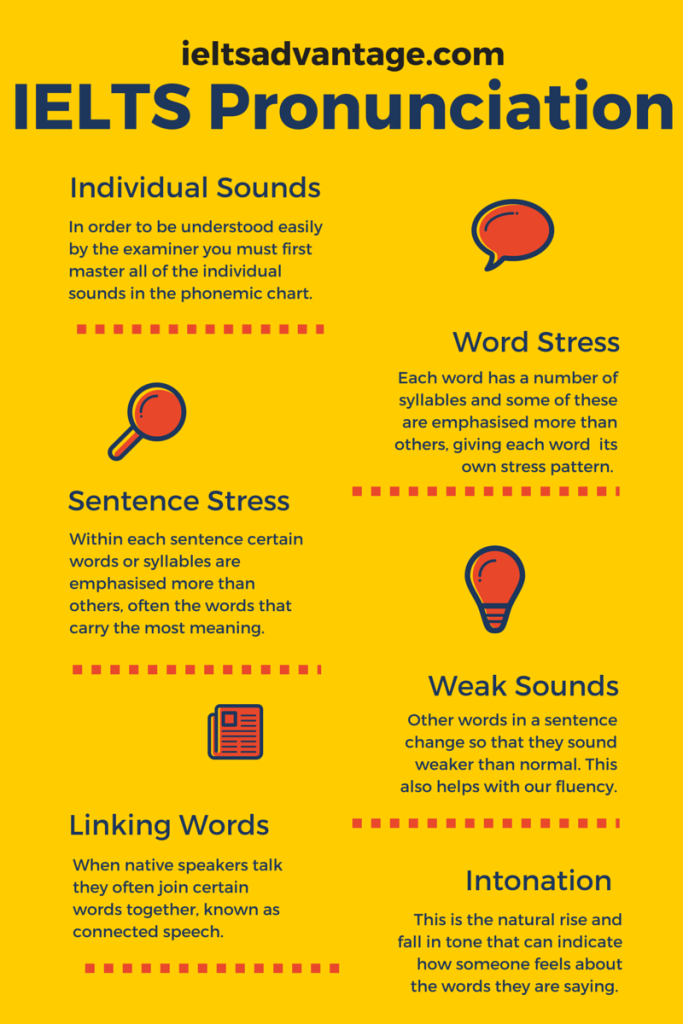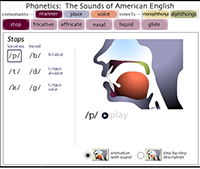Introduction
On the IELTS Speaking test, you will be graded on four different things:
- Vocabulary (25%)
- Grammar (25%)
- Fluency and Coherence (25%)
- Pronunciation (25%)
Pronunciation also affects our fluency, so you could say that it counts for much more than just 25%.
Pronunciation is often the area that causes the most problems, and many people think that it is ‘difficult’ to learn. Like any skill, it takes practice, but you also need to know how to practice.
This guide will raise your awareness about pronunciation features and teach you ways to practice pronunciation at home.
Marking Criteria
To get a Band 8 for pronunciation, you must do the following things:
- be easy to understand
- use a wide range of pronunciation features
But what are these ‘pronunciation features’, and how can we improve them?
Pronunciation Features
To get a high score on the IELTS Speaking test, you should be able to use the following features:

Individual Sounds

Every sound in the English language is contained in the phonemic chart above. It is separated into vowel sounds at the top and consonant sounds at the bottom. Each word is made up of these sounds.
This chart is very useful for identifying difficult sounds or sounds that you have a problem with. Everyone has a few sounds that they find difficult to pronounce, and by fixing them, you will really improve your pronunciation.
First, we need to know how the phonemic chart works, and the best way to do this is to play around with an interactive one. Here is a link to the British Council’s interactive phonemic chart.
Phonemic Spelling
You then need to find out where to find the phonemic spellings of each word. Most online dictionaries will be able to tell you, but I find Cambridge Dictionaries Online to be the most reliable.
Making the Correct Sounds
Do you think that pronunciation mostly comes from your brain (thinking about the sounds) or your body (physically making the sounds)?
It is both, but I would argue that it has more to do with your body than your brain. Like a whistle, trumpet or flute, the position of your mouth, tongue and jaw is important.
Practising IELTS Pronunciation at Home
There are two websites you can use at home to help you improve your pronunciation of individual sounds.
There first one is called Howjsay Website.
This website allows you to input any English word, and it will automatically let you listen to how a native speaker says that word.
The next website shows you how to make each sound.

Sound of Speech displays interactive videos that allow you to see where to position your tongue, jaw and lips. You can then practice making these sounds. A good technique is to use a mirror while you are practising.
Exercise
So the technique you can use at home is as follows:
1. Look at how the word is spelt using the phonemic chart using an online dictionary.
2. Find out what each of these sounds like using the phonemic chart.
3. Listen to how the words sound using howjsay.com
4. Use sounds of speech to find out how to make each sound.
Try it with the following words that many people find difficult to pronounce:
- manage
- Wednesday
- talent
- weather
- selfish
- identical
- thought
- colleague
Stress
Stress is when we emphasise (say strongly) certain words or syllables.
There are two types of stress:
- Word stress
- Sentence stress
Word Stress
Every word is made up of syllables; normally, one or more of these are said more strongly than the others. If we don’t do this correctly, it is often difficult for a native speaker to understand what is being said, which can lose you marks on the IELTS test.
Think about these words:
Photograph
Photographer
Photographic
How many syllables do they have? Which syllables do you stress?
I have underlined which syllables are stressed:
Photograph
Photographer
Photographic
Exercise
In most two-syllable nouns and adjectives, the _______ syllable takes on the stress.
- samples
- carton
- colourful
- rainy
In most two-syllable verbs and prepositions, the stress is on the _______ syllable.
Examples:
- relax
- receive
- direct
Sentence Stress
Think about the following sentence:
Meet me at 9pm on the corner of 5th and 6th Streets on Saturday.
Which words would you stress?
In this sentence, we would probably stress the words I have underlined:
Meet me at 9pm on the corner of 5th and 6th Streets on Saturday.
There are two different kinds of words in a sentence:
- Content words
- Function words
Content words are words that carry meaning. They are often (but not always) verbs, nouns, adjectives or adverbs. We normally stress content words because they are the most important. Without them, the sentence has no meaning.
Function words carry no meaning and instead are mostly grammar rules. They are not as important as content words, and we don’t stress them. They are words like pronouns, articles and prepositions.
Exercise
Look at the sentences below and underline the content words:
- Have you seen the new film about Dinosaurs?
- What did he say to you in the park?
- He’s had a heart attack.
- How long are you going for?
- Do you want to go to the market?
Practice saying these sentences with the correct stress.
Shifting Stress
Sometimes changing the stress can change the meaning of a sentence. What word would you stress in this sentence?
I didn’t say we should kill him.
How many meanings does the above sentence have?
We would normally stress ‘didn’t’ but try to stress the other words one at a time and think about how this changes the meaning of the whole sentence.
For example, if we stress ‘say’ that means you didn’t say you should kill him, but you wrote it to someone or signalled to someone, but you didn’t say it.
If we stress ‘kill’ it means we didn’t say ‘kill’; we said some other verb like ‘beat’, ‘kiss’ or ‘hug’, not ‘kill’.
Exercise
How does shifting the stress on each different word change the meaning of the following sentence?
I love your mother’s cooking.
Weak Sounds
As we have seen above, we stress certain words in a sentence by saying them more strongly than others, but we also need to be aware of certain words that we don’t stress. These words are called weak sounds.
These words are often function words that are not important because they don’t carry any meaning. We make a sound weak by changing the vowel sound to /ə/.
This not only helps us sound more like native speakers but also helps us speak more smoothly, therefore helping us improve our fluency. It also helps with listening because most sentences in English contain weak sounds, which often causes problems for English learners.
Exercise
Look at the sentences below and mark the weak sounds:
- Have you seen the new film about Dinosaurs?
- What did he say to you in the park?
- He’s had a heart attack.
- How long are you going for?
- Do you want to go to the market?
Practice saying these sentences.
Linking Sounds
Have you ever listened to native English speakers talk, and you think that they are speaking too fast? It is probably because of linking words.
When we speak, we don’t normally say a word, then stop, then say the next word in the sentence, then stop and so on. When native speakers talk, their words often link together, making them sound more fluent. In other words, when native speakers talk, the last and first sounds of some words can change.
Consonant to vowel linking
When one word ends with a consonant sound, and the next word begins with a vowel sound, the two sounds join together.
Look at the sentence below, say it and think about how the words link together.
It’s a little bit of a problem.
The last sound of ‘It’s’ is a consonant, and the next sound in ‘a’ is a vowel sound, so they link together to sound like ‘itsa’.
The same thing happens with ‘bit of a’. All of these words link together, so it sounds like ‘bitova’.
Vowel-to-vowel linking
When one word finishes with a vowel sound and the next one starts with a vowel sound, they link together, and a /w/ or /j/ can be added.
Say the following words quickly together. What do you notice about the linking sound?
Two eggs Three eggs
A /w/ sound is added to ‘Two eggs’.
A /y/ sound is added to ‘Three eggs’.
Sounds doubling up
When a word ends in a consonant sound, and the next word begins with the same consonant sound, we don’t use both sounds; instead, they join together as one.
Say the following phrases and think about what happens to the sounds in bold.
I’m a bit tired
We have a lot to do
Tell me what to say
Micro-listening
You can improve your listening and pronunciation at the same time using micro-listening. Micro-listening is when you find a video or recording of a native speaker talking naturally and pause when you hear something you don’t understand. Likely, you didn’t understand what was being said because of linking.
You then listen to that one sentence, again and again, many times until you have deconstructed the sentence and written it out correctly. You can then identify the linking words and then practice the linking by copying what you have heard. Try it and see. It has really helped my students improve both their listening and pronunciation.
Intonation
Intonation refers to the natural rising and falling in a tone that you normally hear from native English speakers.
A change in intonation can affect what people mean, even if they are saying the same word.
For example, if you were late for class and your teacher said to you, ‘That’s OK. Please take a seat.’ it would mean they are unhappy if they said it with a falling tone and happy if they said it with a rising tone.
There are several ways our voices can change in tone, including-
- fall
- rise
- flat (no change)
- fall-rise
- rise-fall
If we say the word ‘coffee’ with different intonation patterns, it can completely change the meaning. Say the word with each of the intonation patterns above. How does the meaning change?
The biggest mistake students make on the IELTS test is not using intonation. This leads to you sounding like you have no attitude about the topic you are talking about (and are a little bit boring).
It is much better to sound enthusiastic about what we are talking about, and we can do this by going up in the middle of a sentence and down towards the end. Up shows that we have a positive attitude towards the topic and going down at the end shows that the sentence is finished. However, this is a very general rule, and there are many variations.
The best way to improve your pronunciation is to listen to native speakers and copy their intonation. You can do this by watching English-speaking movies, TV, podcasts, or lectures online.
I hope you found this article useful. You’ll find even more help on our free IELTS Speaking page. Please let me know if you have any questions or comments below or join the conversation on our Facebook page.
